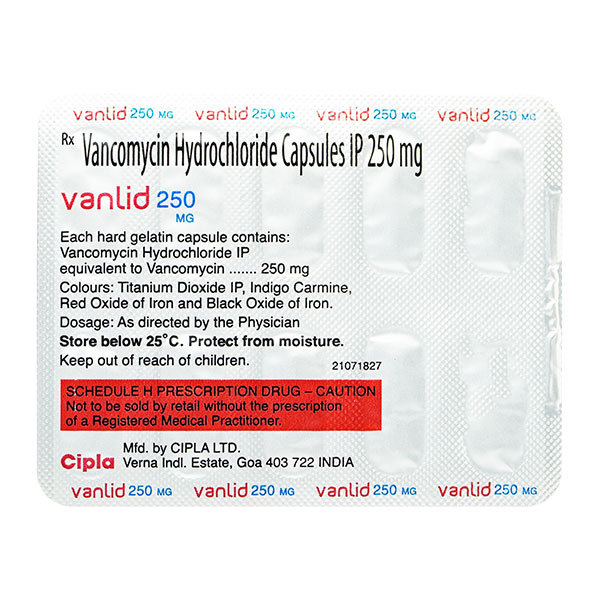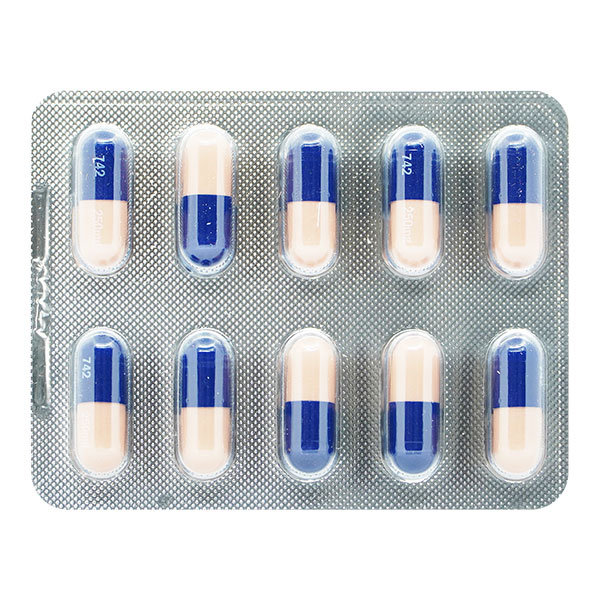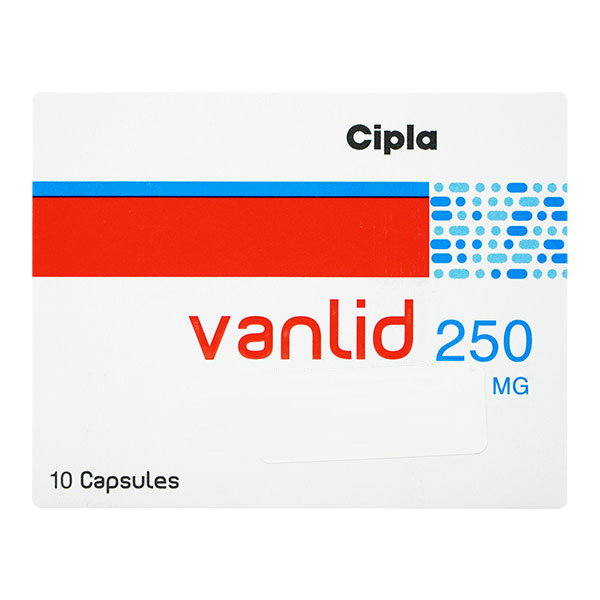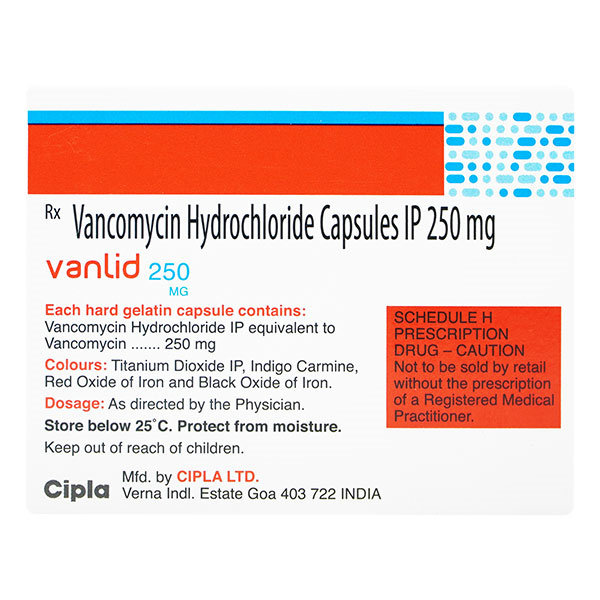Vanlid 250 mg Capsule 10's
MRP ₹1627.5
(Inclusive of all Taxes)
₹244.1 Cashback (15%)
Provide Delivery Location
Online payment accepted
 Prescription drug
Prescription drugWhats That
Composition :
Manufacturer/Marketer :
Consume Type :
Expires on or after :
Return Policy :
About Vanlid 250 mg Capsule
Vanlid 250 mg Capsule belongs to the class of 'glycopeptide antibiotics', primarily used to treat bacterial infections of the intestines. It is effective in treating Clostridium difficile-associated diarrhoea and enterocolitis caused by Staphylococcus aureus.
Vanlid 250 mg Capsule contains 'Vancomycin' that has a bactericidal (kills bacteria) effect. It works by preventing bacterial cell wall synthesis, resulting in bacterial cell death. Vanlid 250 mg Capsule effectively treats infections caused by gram-positive and anaerobic (living without air) bacteria like Staphylococcus aureus (including methicillin-resistant isolates) and Clostridium difficile isolates.
Take Vanlid 250 mg Capsule as advised by your doctor. Common side effects of this medicine include abdominal pain, nausea, and low potassium levels. Most of these side effects do not require medical attention and gradually resolve over time. If these side effects persist longer, please consult your doctor.
Avoid taking Vanlid 250 mg Capsule if you are allergic to it. Inform your doctor of your complete medical history, including any liver/kidney diseases, gastrointestinal diseases (ulcerative colitis, Crohn's disease), and hearing problems. If you are pregnant or breastfeeding, consult your doctor before taking Vanlid 250 mg Capsule . Safety and effectiveness of Vanlid 250 mg Capsule in patients below 18 years of age have not been established.
Uses of Vanlid 250 mg Capsule
Directions for Use
Key Benefits
Vanlid 250 mg Capsule is a glycopeptide antibiotic that treats bacterial infections of the intestines. It contains Vancomycin, which works by destroying the bacterial cell. It is bactericidal in action and effectively treats infections caused by gram-positive and anaerobic (living without air) bacteria.
Storage
Drug Warnings
Do not use Vanlid 250 mg Capsule if you are allergic to Vanlid 250 mg Capsule or its components. Let your doctor know if you have liver or kidney, gastrointestinal, or hearing problems. Pregnant and breastfeeding women should consult their doctor before taking Vanlid 250 mg Capsule . Please avoid alcohol intake during treatment with Vanlid 250 mg Capsule to avail maximum benefits of the medicine and prevent the disease's worsening. Safety and effectiveness of Vanlid 250 mg Capsule in patients below 18 years of age have not been established.
Drug-Drug Interactions
Drug-Drug Interactions
Login/Sign Up
Coadministration of Vanlid 250 mg Capsule with Cidofovir can increase the risk or severity of kidney problems.
How to manage the interaction:
Taking Vanlid 250 mg Capsule with Cidofovir is not recommended as it can result in an interaction, it can be taken if your doctor has advised it. You should seek immediate medical attention if you develop signs such as nausea, vomiting, loss of hunger, increased or decreased urination, sudden weight gain or weight loss, fluid retention, swelling, shortness of breath, bone pain, muscle cramps, tiredness, weakness, dizziness, confusion, and irregular heart rhythm.
Taking Vanlid 250 mg Capsule with the BCG vaccine can decrease the effects of the BCG vaccine.
How to manage the interaction:
Although there is a possible interaction between Valsartan and the BCG vaccine, you can take these medicines together if prescribed by a doctor. Do not discontinue any medications without a doctor's advice.
Coadministration of Vanlid 250 mg Capsule with Temsirolimus can increase the risk or severity of kidney problems.
How to manage the interaction:
Taking Vanlid 250 mg Capsule with Temsirolimus may result in an interaction, they can be taken together if prescribed by a doctor. However, contact a doctor immediately if you experience nausea, vomiting, loss of appetite, increased or decreased urination, sudden weight gain or weight loss, fluid retention, swelling, shortness of breath, bone pain, muscle cramps, tiredness, weakness, dizziness, confusion, and irregular heart rhythm. Do not discontinue any medication without consulting a doctor.
Coadministration of Mefenamic acid with Tenofovir disoproxil can increase the risk or severity of kidney problems.
How to manage the interaction:
Taking Vanlid 250 mg Capsule with Tenofovir disoproxil may result in an interaction, but it can be taken together if a doctor prescribes it. However, contact a doctor immediately if you experience nausea, vomiting, loss of appetite, increased or decreased urination, sudden weight gain or weight loss, swelling, shortness of breath, bone pain, muscle cramps, tiredness, weakness, dizziness, confusion, and irregular heart rhythm. Do not discontinue any medication without consulting a doctor.
Coadministration of Vanlid 250 mg Capsule with Iohexol can increase the risk or severity of kidney problems.
How to manage the interaction:
Taking Vanlid 250 mg Capsule with Iohexol may result in an interaction, they can be taken together if prescribed by a doctor. However, contact a doctor immediately if you experience nausea, vomiting, loss of appetite, increased or decreased urination, sudden weight gain or weight loss, fluid retention, swelling, shortness of breath, bone pain, muscle cramps, tiredness, weakness, dizziness, confusion, and irregular heart rhythm. Do not discontinue any medication without consulting a doctor.
Coadministration of Vanlid 250 mg Capsule with Iodixanol can increase the risk or severity of kidney problems.
How to manage the interaction:
Taking Vanlid 250 mg Capsule with Iodixanol may result in an interaction, they can be taken together if prescribed by a doctor. However, contact a doctor immediately if you experience nausea, vomiting, loss of appetite, increased or decreased urination, sudden weight gain or weight loss, fluid retention, swelling, shortness of breath, bone pain, muscle cramps, tiredness, weakness, dizziness, confusion, and irregular heart rhythm. Do not discontinue any medication without consulting a doctor.
Coadministration of Vanlid 250 mg Capsule with Sirolimus can increase the risk or severity of kidney problems.
How to manage the interaction:
Taking Vanlid 250 mg Capsule with Sirolimus may result in an interaction, they can be taken together if prescribed by a doctor. However, contact a doctor immediately if you experience nausea, vomiting, loss of appetite, increased or decreased urination, sudden weight gain or weight loss, fluid retention, swelling, shortness of breath, bone pain, muscle cramps, tiredness, weakness, dizziness, confusion, and irregular heart rhythm. Do not discontinue any medication without consulting a doctor.
Taking Vanlid 250 mg Capsule with Cholera, live attenuated reduces the activity of the vaccine.
How to manage the interaction:
Although taking Vanlid 250 mg Capsule together with Adefovir dipivoxil may result in an interaction, they can be taken together if prescribed by a doctor. However, contact a doctor immediately if you experience Breathlessness, decreased blood pressure, Wheezing, or Flushing (sense of warmth in the face, ears, neck and trunk). Do not discontinue any medication without consulting a doctor.
Coadministration of Vanlid 250 mg Capsule with Tacrolimus can increase the risk of kidney problems.
How to manage the interaction:
Taking Vanlid 250 mg Capsule with Tacrolimus may result in an interaction, they can be taken together if prescribed by a doctor. However, contact a doctor immediately if you experience nausea, vomiting, loss of hunger, increased or decreased urination, sudden weight gain or weight loss, fluid retention, swelling, shortness of breath, bone pain, muscle cramps, tiredness, weakness, dizziness, confusion, and irregular heart rhythm. Do not discontinue any medication without consulting a doctor.
Taking Vanlid 250 mg Capsule with Ioversol can increase the risk of kidney damage.
How to manage the interaction:
Although taking Vanlid 250 mg Capsule together with Ioversol may result in an interaction, they can be taken together if prescribed by a doctor. However, contact a doctor immediately if you experience nausea, vomiting, loss of appetite, increased or decreased urination, sudden weight gain or weight loss, fluid retention, swelling, shortness of breath, bone pain, muscle cramps, tiredness, weakness, dizziness, confusion, and irregular heart rhythms. Do not discontinue any medication without consulting a doctor.
Drug-Food Interactions
Drug-Food Interactions
Login/Sign Up
Diet & Lifestyle Advise
- Wash your hands often to maintain cleanliness.
- Avoid sharing personal items like shaving razors.
- Include whole-grain foods like multigrain bread and brown rice in your diet.
- Taking probiotics after an antibiotic treatment reduces the risk of antibiotic-associated diarrhoea.
- Try taking yoghurt, cheese, sauerkraut, and kimchi that help restore the intestine's good bacteria.
- Include more fibre-enriched food in your diet that is easily digested by your gut bacteria. Fibre foods may also help restore healthy gut bacteria after a course of antibiotics.
- Avoid intake of alcoholic beverages as they can make you dehydrated and affect your sleep.
- Manage stress, eat healthily, drink plenty of water, exercise regularly, and get plenty of sleep.
Side Effects of Vanlid 250 mg Capsule
- Abdominal pain
- Nausea
- Low potassium levels
Habit Forming
Therapeutic Class
All Substitutes & Brand Comparisons
RX
Out of StockUvanco 250 Capsule
Uvtech Biosciences Pvt Ltd
₹1180.6
(₹106.25 per unit)
27% CHEAPERRX
Out of StockVantinel 250mg Capsule
₹1399
(₹125.91 per unit)
14% CHEAPER
Author Details
We provide you with authentic, trustworthy and relevant information
Drug-Diseases Interactions
Drug-Diseases Interactions
Login/Sign Up
FAQs
Drug-Drug Interactions Checker List
- FUROSEMIDE
Special Advise
- Monitoring kidney function is advised during therapy with Vancomycin in the older population.
- Regular assessment of auditory function is recommended in people who have hearing problems and take Vancomycin.
- Regular monitoring of potassium levels is advised.
Disease/Condition Glossary
Clostridium difficile-associated diarrhoea: This is caused by a bacterium known as Clostridium difficile (C. diff). It commonly affects people who use antibiotic medications. Symptoms of Clostridium difficile infection include diarrhoea/watery stools, high temperature, loss of appetite, sickness, and stomach ache. Treatment includes stopping the antibiotics that cause an infection, using an antibiotic course that controls the infection, and preventive measures like maintaining hygiene and cleanliness.
Enterocolitis: It is an inflammation of the digestive tract that involves enteritis of the small intestine and colitis of the colon. Symptoms include cramps, bloating, watery stools/diarrhoea, fever, tiredness, and stomach pain.

Have a query?
Alcohol
Safe if prescribed
Avoid taking alcohol while using Vanlid 250 mg Capsule since it may worsen the disease condition.
Pregnancy
Consult your doctor
During pregnancy, this medicine should be used only if clearly needed. Please consult your doctor before taking Vanlid 250 mg Capsule if you are pregnant or planning to conceive.
Breast Feeding
Consult your doctor
There is limited information on how Vanlid 250 mg Capsule affects breastfeeding. Please consult your doctor before taking Vanlid 250 mg Capsule if you are breastfeeding.
Driving
Safe if prescribed
Vanlid 250 mg Capsule usually does not interfere with your driving ability.
Liver
Consult your doctor
Inform your doctor if you have any history of liver diseases before taking Vanlid 250 mg Capsule .
Kidney
Consult your doctor
Inform your doctor if you have any history of kidney diseases before taking Vanlid 250 mg Capsule .
Children
Safe if prescribed
Safety and effectiveness of Vanlid 250 mg Capsule in patients below 18 years of age have not been established.














